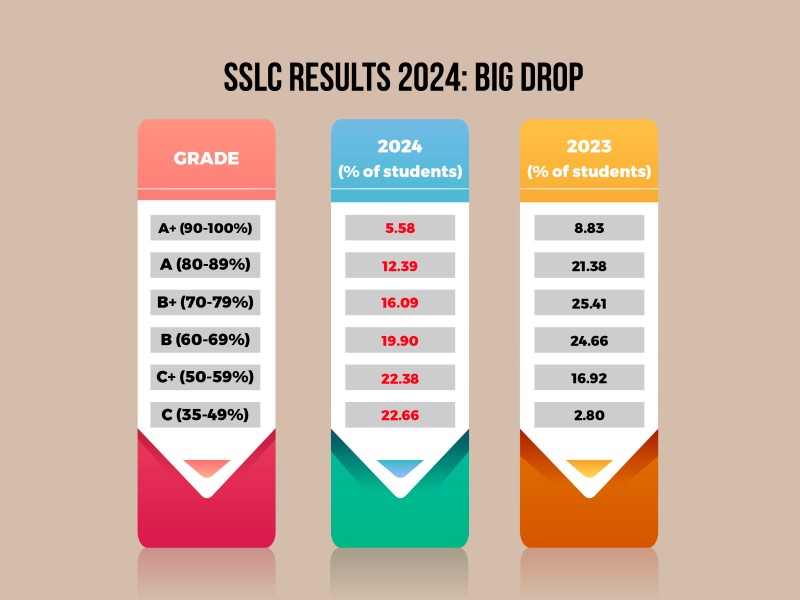– Reshma Ravishanker
The results of Karnataka’s SSLC exams will be disadvantageous for state syllabus students seeking admissions into Pre-University Colleges (PUC) this year as compared to the other boards, experts opine.
The Karnataka School Examination and Assessment Board (KSEAB) on Thursday announced the results of the class 10 state board exams. A mere 54 percent of students had passed, the results of which then “improved” to reach 73.4 percent by doling additional grace marks to students.
However, the percentage of students securing 70 percent and above has also reduced by a large margin. For instance, among all students who appeared for SSLC last year, 8.3 percent students secured A+ (90-100%) as against 5.58 percent this year. Similarly, a mere 12.9 percent students secured A grade (80-90%) as against 21.38 percent students last year.
Experts drew a comparison between this year’s abysmally poor state board results and an exceptionally high pass percentage in ICSE. On May 6, the Council for the Indian School Certificate Examinations (CISCE) announced that the all-India pass percentage was as high as 99.47 percent this time. This indicated that a mere 48 students in the country failed in class 10 ICSE exams.
Dr M Mohan Alva, president, Karnataka Unaided Pre-University College Management Association (KUPMA) said that this parity in results will act as a disadvantage for state board students.
“Each consecutive government in Karnataka is either extreme right or left and education is their favourite area to meddle with. It is a sorry situation. In CBSE, a student needs to secure 13 out of 80 to pass. In the state syllabus, it is 35. If one is to see this year’s ICSE result, how can a shocking 99.68 percent of students pass while the syllabus is tougher? Neighbouring Kerala reports a 98 percent pass results in class 10 boards. What does this reflect about the status in Karnataka?” he questioned.
“When it comes to admissions into PU colleges, state board students would suffer because of the low scores. If the government’s justification is that the low scores are because of stringent methods adopted during exams, do you accept that 30 percent students indulged in malpractice all these years? Isn’t it shameful?” he questioned.
Nandita (name changed), a SSLC student, rued, “The overall ICSE results are excellent. CBSE is bound to pass a large majority of students as always. Why are we the only ones to suffer? Those who did not pass got grace marks. Marks of those with distinction remained unaltered. Why is that percentage so low this time? A student securing 80 percent and above would find no need to indulge in malpractice. That being the case, how are those statistics also so low? The state has let us down,” she said.
Larger conspiracy
Meanwhile, D Shashi Kumar, general secretary, Associated Managements of Primary & Secondary Schools in Karnataka (KAMS) said that these fiascos in Karnataka are sustained, incessant attempts to shutter state board schools.
“Firstly, it is the class V, VI and VIII exams controversy. Then the CET out of syllabus questions and here is another. Why do all these target only state board students? The larger agenda of the state is to drive students towards CBSE and ICSE boards, which is picturised as better managed and allow state board schools to suffer.
“Else, how did students of the same age, same learning abilities (ICSE) score so much higher than state board students? Across India, just 26 cases of malpractice were reported during ICSE Exams. If the state claims that the pass percentage dropped by 30 percent because of curbing malpractice, what are the standards of conduct of ICSE and CBSE exams? Why are state board students only a repeated target?” he questioned.
He added that it was because of double standards between boards that the state syllabus students would suffer while seeking admission for higher education.
Also read:
ICSE & ISC 2023 results out, CISCE does away with merit lists of toppers
